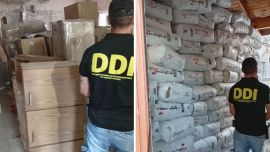After months of negotiations with the International Monetary Fund, Sergio Massa pulled off a debt-defying deal that will keep Argentina’s economy afloat for another while.
The agreement temporarily eased investor angst that the country would go into arrears with the IMF. Whether it can buoy the economy minister’s presidential ambitions is far less certain.
With just two weeks until Aug. 13 primaries that history indicates will go a long way in determining the outcome of October’s elections, Massa appears better placed than Argentina’s scorched economic record would suggest. Polls are tight, the opposition divided — and now he can point to the prospect of as much as US$10.8 billion in funding from the Washington-based lender.
Aside from temporary market calm, however, the fine print of the agreement struck on Friday offers little scope for the Peronist government to spend big to curry voter favour, and hence hopes it will provide a boost to Massa’s chances of taking the Casa Rosada look scant.
“What this did was avoid collapse,” said Maria Castiglioni, director of consulting firm C&T Asesores in Buenos Aires. “But you’re still in intensive care.”
That reality points to the fundamental dilemma facing Massa as he attempts the transition from minister at least nominally in charge of a cratering economy to presidential candidate with the vision needed to offer fresh hope to a bruised electorate.
While markets welcomed Massa’s candidacy and his new deal with the IMF, the details of the agreement likely won’t move the average voter, according to Carlos Ruckauf, vice president of Argentina from 1995 to 1999. That voter “gets mad when he goes to the supermarket and doesn’t have enough money to buy the things he needs,” said Ruckauf.
It’s a challenge not lost on Massa, 51, who barely mentioned the lender during two campaign stops in the northern provinces of La Rioja and San Juan on Friday, just hours after the deal was announced. The only references he made to the IMF, much-reviled among his audience, were to enumerate the burdens he has had to shoulder during his time in office.
He’s aware of the paradox that electoral success could push markets over the edge as it fears another four years of Peronism — the leftist populism named after former President Juan Peron that has proven so flexible and potent over the decades.
Argentines withdrew 43% of all dollar deposits in the three months after the 2019 primary vote, when Alberto Fernandez pummeled then-President Mauricio Macri and went on to win the nation’s top office, a beating from which neither Macri nor the economy ever recovered.
“Massa’s greatest weakness is also his greatest strength, and that is being at the head of the economy,” said Shila Vilker, director of Buenos Aires-based polling firm Trespuntozero. “There is a clear demand from voters for decision-making. Massa might not find results, but he is seen making decisions.”
Given the Fernandez coalition’s woeful record, polls suggest the primary vote is closer than might have been anticipated. The margin between the ruling Peronist bloc and main opposition coalition Juntos por el Cambio — divided between former security minister Patricia Bullrich and Buenos Aires Mayor Horacio Rodriguez Larreta — has narrowed to 3.1 percentage points, a July 25 compilation of polls by investment firm Latin Securities showed.
The polling average gave Juntos por el Cambio some 32% support to about 29% for the incumbent government, with outsider Javier Milei at 19%. Among individual candidates, Massa is the frontrunner with 24%, followed by Bullrich.
Argentina’s economy remains top of mind for voters, however, and there’s little margin for Massa to turn it around. Annual inflation is running at 115.6% and the country is hurtling toward another recession. Under the IMF deal, Argentina weakened some trade-related exchange rates, adding to inflationary pressure.
Investors and Argentines alike widely expect a devaluation of the currency as the official and parallel exchange rates trade at a massive gap.
The IMF also asked Buenos Aires to rein in spending, cut energy subsidies and halt its money-printing presses, denying the government tools it would normally be able to deploy in an election year. The first tranche of payments is being withheld until after the primary.
That said, Massa’s main asset may be the political machinery of the unwavering Peronist base, a formidable operation that strategists know never to discount.
And his core campaign strategy is to play up his role fronting “such a difficult economic situation,” said Gustavo Martinez Pandiani, a foreign ambassador and longtime adviser to Massa. “Far from hiding, he’s jumping on top of the bomb, which is what he did with the economy,” said Pandiani.
Massa took over the embattled Economy Ministry last August, after the abrupt resignation of Martin Guzman that sent the peso into freefall. Massa introduced additional layers to a thicket of currency controls, price freezes and different exchange rates in a bid to tame the economy. Taking on the toughest job in Argentina is part of a decade-long quest for the presidency, according to Diego Genoud, author of a biography of Massa.
Massa entered politics as a teenager, through the far-right, now-defunct Unión del Centro Democrático, before climbing the Peronist ranks, ultimately becoming a right-hand man to Cristina Fernandez de Kirchner as her chief of staff. He broke with Kirchner in 2013 to form his own party and ran on a platform to sweep her from power in 2015. He joined forces with Kirchner again in 2019, and was anointed her party’s candidate this year.
Massa won the Peronist ticket “because of his great capacity to move among the powerful,” Genoud said. “The question is whether the average citizen values Massa as much as the powerful. That’s what we will find out.”
By Manuela Tobias/Bloomberg




















Comments